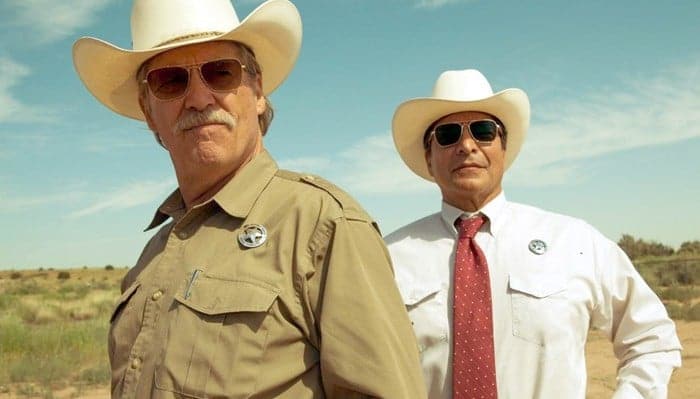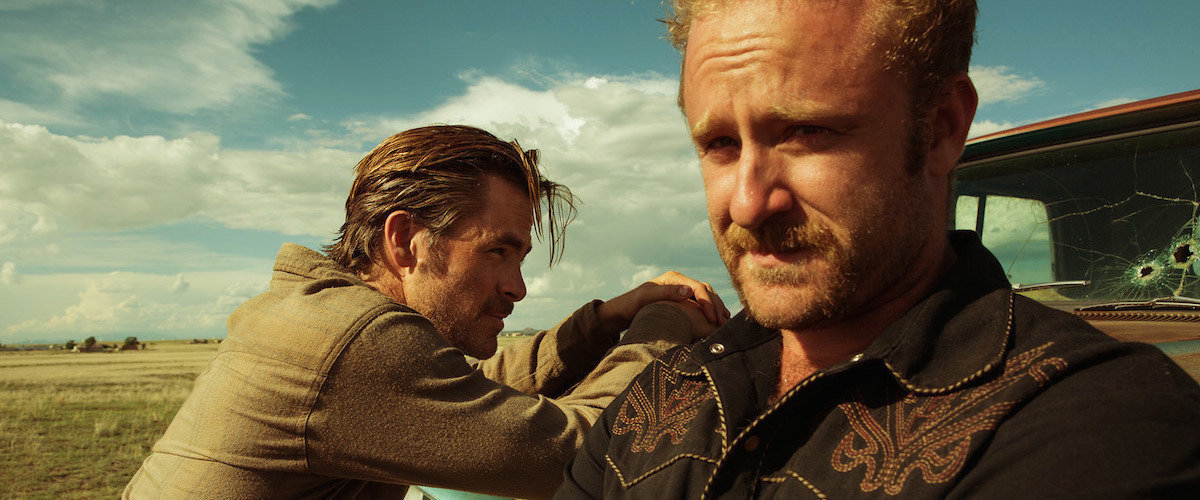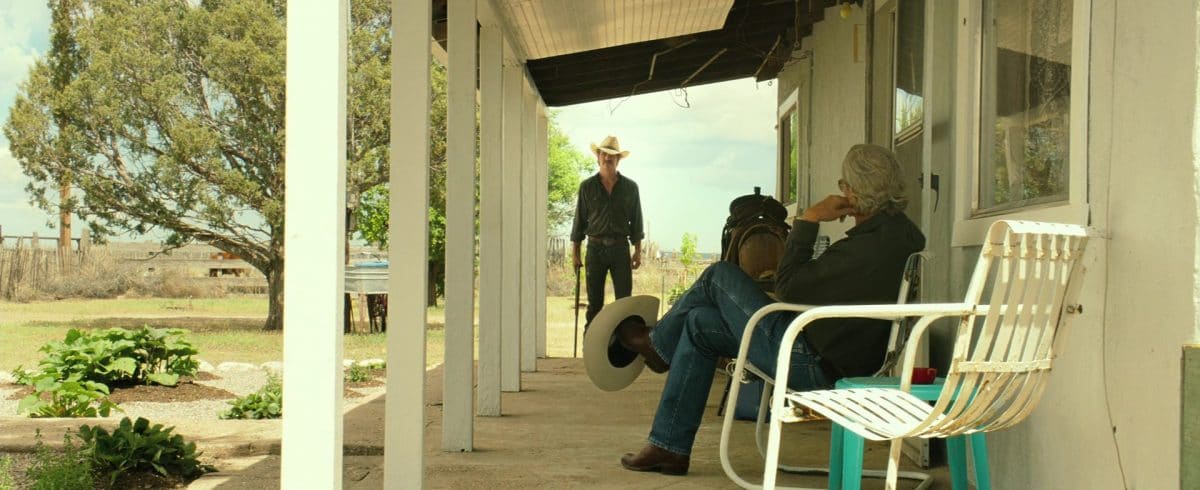 Written by: Taylor Sheridan
Written by: Taylor Sheridan
Directed by: David Mackenzie
Genre: Golden Fleece
Opening Image: A car circles like a shark, out of place in a sleepy commercial area of a small West Texas town. Of particular interest, a local branch of Texas Midlands Bank.
Set-Up: An unsuspecting woman has a smoke before opening the bank branch. Suddenly two masked robbers swoop in. Though the robbery doesn’t go exactly as planned – they’re clearly new at this – they make a successful getaway with the cash.
In the getaway car, we see the dynamic between the robbers, the Howard brothers: hardworking, reluctant criminal Toby (Chris Pine), and loose-cannon Tanner (Ben Foster).
Theme Stated: It’s here that we hear Tanner say, “I go as easy on them as they go on me.” Though he’s referring specifically to the bank teller putting up a fight, this also speaks to the theme. Survival is a zero sum game; how far can and should a man go to survive?
Set-Up (cont’d): On the road, they pass a “Debt Relief” sign, adding to our overall sense of struggle, in the environment and the people.
They hit a second bank, where an elderly customer shoots at them as they make their exit. This is Texas.
In the getaway car again, we learn a bit more: they’re doing this all week. The brothers arrive at a farm, where they bury the getaway car. They do have a well thought-out plan, even if they’re still getting the hang of it.

Catalyst: We meet Texas Rangers Marcus Hamilton (Jeff Bridges) and Alberto Parker (Gil Birmingham) as one says to the other, “Hear about those bank robberies?” This moment triggers the main story conflict we’ll watch for the rest of the movie. This Catalyst throws a serious wrench in the Howard brothers’ plan; they just don’t know it yet.
Debate: Toby and Tanner negotiate some old family tension and we learn that Tanner spent time in prison for shooting their father. As they discuss their shared past, the subtext continues to debate the theme of the story. Is it better to accept what’s doled out, or to fight back?
Meanwhile, the Rangers arrive at the site of the first bank robbery. They’re gauging whether there’s a real case here, or if this was a one-off. Marcus theorizes the robbers aren’t done yet. Is he right? Is there more to come?
Later, the brothers are at a diner and we learn that Toby hasn’t seen his sons in almost a year – at least in part because he doesn’t have the money to pay his wife what he owes her in child support. Tanner and Toby discuss changing their plan to accommodate paying her now so that Toby can see his boys, in this subtle but important exchange:
Toby: You talk like we ain’t gonna get away with this.
Tanner: I ain’t never met nobody who got away with anything. Ever. Have you?
This reinforces just how dangerous their task is, and is the last moment when Toby could turn back. Tanner, with far less to lose, never has any doubts about their spree.
Break into Two: Tanner then goes off and robs another bank, deviating from their plan, without letting Toby know in advance. The likelihood of their failure just increased. We now see all the challenges related to Toby, our true protagonist, achieving his goal.
The Rangers are on the road when they hear about the most recent robbery. They pull a u-turn and head to the scene. They are on the case. And we’re into Act 2.
B Story: In the car, the Rangers discuss Marcus’s impending retirement. If we think about the B Story as helping to emphasize or reinforce the theme, it’s easy to see how this subplot acts as a complement. We’ll watch Marcus – a man facing the end of his purpose, his usefulness – grappling with his own version of the survival question as he looks into the void in the quiet moments.
Fun and Games: The Rangers investigate and gather clues. The brothers proceed with their plan – “cleaning” their money at the Indian casino. We get a clue as to what the purpose of all of this is when Toby has the casino exchange the money in a check made out to Texas Midlands Bank.
The strength of the brothers’ relationship is further demonstrated when Toby jumps in and saves Tanner when he’s threatened by some young punks at a gas station, and when Tanner steps in when he thinks Toby’s about to get rolled by an escort in the casino bar.
Throughout the story we also see what the people of West Texas are all about. They’re often portrayed as spirited, not going down without a fight – and this nicely echoes the theme.
Midpoint: The plan is revealed in its entirety when the brothers visit Toby’s lawyer and he lays it all out: if they complete their spree as planned, they’ll have enough money to pay off the debt owed on their mother’s house, which the bank has been cheating them on. They’ll then be able to lease the land to Chevron to drill for oil. Toby’s sons will be taken care of. This scene puts the ticking clock into action when the lawyer tells them: “They can foreclose on Friday. Come hell or high water you be at the bank in Childress before they close Thursday.”
Bad Guys Close In: Toby goes to his ex-wife’s house. He’s facing the music: a hostile ex, a hostile son he hasn’t seen in far too long. He’s preparing for the end, not knowing how all of this will turn out.
Toby tells his son that they’ll be taken care of financially. But that they’ll hear a lot of bad things about Toby and Tanner. Toby says, “Don’t be like us. Be smart. Look out for your brother.” When his son insists he won’t believe any of what he hears, Toby commands: “Believe it. Cuz I did all of it. Now you do it different.” He’s doing what he must, hoping to give his son a better – and different – kind of life than his own.
A conversation between the Rangers explores the idea of a different kind of “Bad Guy.” Alberto relates the banks stealing Texans’ land to the white men taking the same land from the Comanches generations before.
Alberto also reminds Marcus that he’s stalling, but that won’t stop his “Bad Guys” from coming: “I know what you’re doing. You’re tryin’ to make this last as long as you can. Cuz the longer it lasts the farther you are from your front porch…”

The next morning, the brothers prepare for the last leg of their journey. But when they arrive at the branch they’re robbing, they find it’s closed – permanently. Another casualty of the environment and circumstances – a sign of the times.
They make a plan to hit one of two remaining branches and hope for the best. On the road, Tanner stops and convinces Toby they need to go to the other branch – it’s bigger, so they’ll likely get what they need there. But because it’s bigger and busier, it’s a riskier proposition.
Meanwhile, Marcus tells Alberto that he thinks he knows where they bank robbers are headed next. He’s figured them out.
Toby and Tanner arrive at the branch. It’s full of people.
All Is Lost: They knuckle through, but the robbery goes awry. Gunfire breaks out. Tanner shoots two people. In the process, Toby takes a bullet in his side. They get away but are chased by a mob of armed civilians.
The Rangers learn which branch was hit, which thrills Marcus – he was right.
Dark Night of the Soul: Toby and Tanner are on the run, and Toby’s wounded. He believes it’s all over for them. But Tanner rallies him: “You want to be anything but a black mark on your sons then I need you mountain lion mean, you understand me?”
Tanner stops in the road and singlehandedly chases off the angry civilians following them. Then Tanner tells Toby to continue on with the plan, go to the casino and exchange the money. It’s a good-bye as Tanner changes the plan, sacrificing himself to allow Toby to survive and carry out their original goal.
Break into Three: Tanner lures the arriving cops away while Toby continues on, solo.
Finale: Tanner turns his truck into a firebomb, then has a standoff with the Rangers and other lawmen. Alberto is shot and killed. Marcus manages to blindside Tanner, killing him with one shot.
Meanwhile, Toby is stopped at a checkpoint on the road. After a tense moment he’s allowed to pass. In the casino, Toby hears the news of Tanner’s death.
Toby pays off the bank, as planned. He’s stronger now, standing his ground rather than letting the bank manager have any opportunity to take advantage of him.

Final Image: After some time has passed, we see Marcus still can’t let it go. He’s retired, and restless. He shows up at Toby’s house and though there’s obvious tension, these two survivors share a beer.
Finally Marcus asks why Toby did it; it’s the one thing he can’t figure out. By all appearances now, he didn’t need the money. And people died for this, including Marcus’s own partner – who left behind a family whose struggle is that much harder without him. So, why? Marcus needs to know.
Toby responds, “I been poor my whole life. So were my parents, and their parents before ‘em … Like a disease, passed from generation to generation. And that’s what it becomes, a sickness … Infecting every person you know … But not my boys. Not anymore. This is theirs now.”
Marcus understands him, and the thrill of the chase is gone. Toby is just an ordinary man, who did what he felt he had to do. He and Marcus both know the price that’s been paid, and the weight that they’ll live with.
Naomi Beaty
10 Comments
Leave a Reply Cancel reply
You must be logged in to post a comment.










Nice job…the B story fits into the overall story like a glove. It also has that same desperate feeling as the robbers, who are winding down the end of their road, ie. Life.
I sometimes times have trouble with the B story and it’s loop back into the main.
Been saved by the Cat…
.the Good Jim Jones
Agreed – the B-story here is a great example. Thanks for reading and commenting, Jim!
Naomi
So glad you worked this beat sheet up, Naomi. When I saw this film last year, I thought it was a shoo-in for Best Original Screenplay at the Oscars. Taylor Sheridan’s script structure is so tight and the film resonates. Your beat sheet is succinct, incredibly observant, and very helpful!
Thanks, Don! I agree — I can watch HoHW over and over, I think, because the theme resonates so much. Glad you liked the beat sheet!
Amazing beat sheet. Have been watching the DVD ten minutes at a time for two weeks. Incredibly paced. Only flaw is the overworked foreclosure aspect. Naomi, you have a new fan.
Thanks, Kevin! So glad you enjoyed the beat sheet. And hope the movie holds up for you, when you finally make it to the end :)
My favorite Beat Sheet analysis. Loved the movie and loved the insights…
Thanks so much, Jorge!
The catalyst should be a call to action for the protagonist. The two brothers are the protagonists. Im not sure what the call to action was in this movie or if it really even followed a three act structure.
Hey Brian,
Thanks so much for your comment! Yes, the Catalyst can be a call to action, but that term can be a bit misleading. We often talk about the Catalyst being something that happens to the protag to upset or throw a wrench into his/her world or status quo. I also find it useful to think of the Catalyst simply as introducing the main conflict of the movie. The protagonist doesn’t even have to be aware of it him/herself yet — but the audience sees it, and knows something is happening that the protagonist is going to have to deal with.
Die Hard is a good example of this — the Catalyst is when the terrorists show up. John McClane isn’t even aware of it, but it’s definitely a wrench in his status quo of trying to reconcile with his wife at this stupid office party he doesn’t even really want to be attending. So you can see it’s not really a call to action in the way you might think of that term, but the audience sees that it is going to be something the protag has to take action to deal with.
Hope that helps!